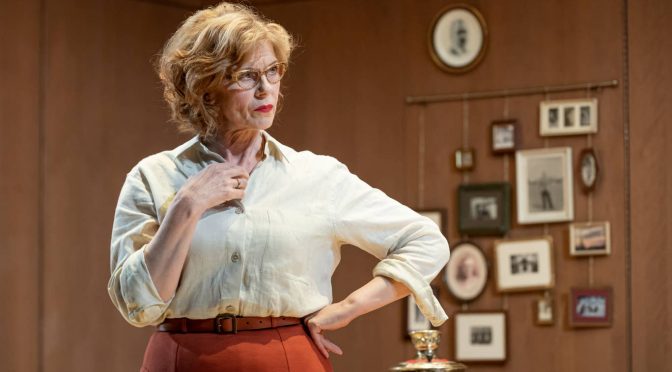Mike Bartlett’s adaptation of Maxim Gorky’s 1910 play is a suitably irreverent and darkly funny version of a text with revolution at its heart. About capitalism as much as feminism, it provides a magnificent title role for Siobhán Redmond and a range of grotesque characters for a strong supporting cast to have fun with. Both Bartlett and director Tinuke Craig have a keen eye on entertaining their audience and, although the show is uneven, the production has enough humour to make it a success.
Vassa is as much a mogul as a matriarch. As her husband lies dying upstairs, her concern is to secure the family business by fiddling his will. She has to tackle her useless sons and mendacious brother-in-law, who each want their inheritance, along with their various romances, all of which are problematic. Herding these cats is done with a vicious tongue and a ruthlessness that beggars belief. Every acid line and heartless act is delivered to perfection by Redmond, who makes a brilliant villain.
Since it was revived this summer, you might think of Githa Sowerby’s Rutherford and Son as an English equivalent to Vassa: close in date, with another tyrannical capitalist and questioning economics. But Gorky, via Bartlett, has a more satirical edge that shows venality in many forms. Yet there’s a fussy feeling to the direction that detracts from how forceful the adaptation is. It’s interesting to see Craig play with elements of farce – notably with Fly Davis’ set full of doors – but unfortunately the comings and goings in this conspiratorial household aren’t that well-handled. Bouquets of flowers that cover the floor for the finale are another example: the idea might delight a florist but the blooms become bothersome.
It isn’t quite accurate to say Vassa only cares about money – her legacy plays a part, too. Any case for her as an arch pragmatist is weakened by this (for the better) while abuses of power for its own sake bubble underneath the text. The results allow a depth to her character that might surprise and that Redmond excels with. The relationship with her daughter, played exquisitely by Amber James, proves fascinating. Likewise her affection for her daughter-in-law Dunya, played by Daniella Isaacs, is developed well. More unhappily, the fate of her maid Lipa, superbly performed by Alexandra Dowling, brings home how high the stakes are.
It’s the men in the piece that let the production down. This isn’t quite Bartlett’s fault, or the performers’ – Vassa dominates the play so much that, when she’s off stage, interest plummets. As her sons, Arthur Hughes and Danny Kirrane have characters a touch too hysterical to deal with. And as Vassa’s potential nemesis, Michael Gould’s Prokhor just isn’t enough of a threat. Thankfully, with a lot of judiciously placed swearing, the text is fresh as well as funny. And the attention to detail is great. There’s a brilliant line about an off-stage character, described as “so drunk he fell over his own arm”. Touches like that aren’t just funny – they convey Vassa’s world so vividly that visiting it proves engrossing.
Until 23 November 2019
Photo by Marc Brenner

